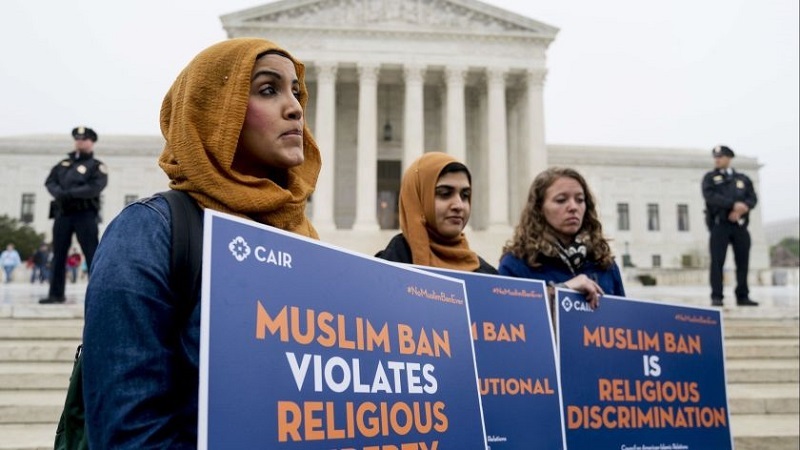The US House of Representatives on Wednesday passed legislation that would repeal the Trump administration’s controversial ‘anti-Muslim’ travel ban, in what has been called the first Muslim civil rights bill in US history.
The bill would outright prohibit any future president from using religious discrimination as grounds for restricting immigration.
Dubbed the NO BAN Act – short for National Origin-Based Antidiscrimination for Nonimmigrants – it was introduced in April 2019 by Delaware Senator Chris Coons and California Rep. Judy Chu.
“This is a historic moment for Muslims,” Farhana Khera, executive director of Muslim Advocates, one of the groups working in support of the bill, said ahead of the vote.
She added that passage of the act will “show Muslims, who have been banned and scapegoated by the Trump administration, that we deserve rights and dignity”.
The Muslim Public Affairs Council (MPAC) praised the outcome: “The collective decision by the House to reject this administration’s racism and xenophobia is commendable. This is the first expressly Muslim civil rights act in our nation’s long and often harsh history.”
The bill passed 233-183 with unanimous support among all House Democrats who voted. They were joined by two Republicans who crossed the aisle to vote yes: Texas Rep. Will Hurd and Pennsylvania Rep. Brian Fitzpatrick.
The bill will now move to the Republican-led Senate, where it is unlikely to clear before it can be signed into law.
The White House expressed opposition to the legislation in March, saying that undoing the travel ban “would harm the national security of the United States” and that the ban has been “central to the Administration’s ongoing efforts to safeguard the American people against the spread of COVID-19.”
While the prospect for passage through Congress this year is dim, the measure is a symbolic victory for Muslim American and civil rights groups, and a way to keep public pressure on for a future rollback of the policy.
The bill also signals a key priority for the Democratic Party ahead of the US presidential elections in November. It allows Democrats to contrast themselves with the incumbent Donald Trump and present themselves as a party that is welcoming to immigrants.
On Monday, Democratic presidential candidate Joe Biden, who is courting Muslim votes, told a Muslim political organisation that he would reverse the ban “on day one” if elected president.
Biden has pledged to work with Congress on new legislation aimed at reducing hate crimes and ending religious and racial profiling. He has also promised to appoint Muslims in his administration.
Evolution of the ban
During his election campaign in 2015, Trump called for a “total and complete shutdown of Muslims entering the United States.” Despite invoking widespread outrage, Trump pressed ahead with his anti-immigration agenda soon after taking office.
Unveiled in January 2017 via executive order, the first iteration of what became known as the Muslim ban halted entry of citizens into the US from seven majority-Muslim countries for 90 days: Iran, Iraq, Libya, Somalia, Sudan, Syria and Yemen.
Organisations like the American Civil Liberties Union (ACLU) charged Trump’s order with violating the US Constitution on two counts: the First Amendment that prohibits religious discrimination, and the Fifth Amendment that guarantees equal treatment under the law.
The controversial injunction had since been retooled amid legal challenges and its latest iteration was upheld by the Supreme Court in 2018.
The current version of the ban (the third that Trump issued) places restrictions on citizens from five majority-Muslim countries: Iran, Libya, Somalia, Syria, Yemen – in addition to Venezuela and North Korea.
The administration expanded the ban in February to target immigrants from six additional countries: Eritrea, Kyrgyzstan, Myanmar, Nigeria, Sudan, and Tanzania. Citizens from these nations can visit and obtain temporary work and student visas, but are not allowed to settle permanently.
Curtailing future bans
The NO BAN act goes beyond just overturning Trump’s travel ban and provides lasting protection against such bans in any future administration.
The legislation would dial back the president’s authority to issue bans under the Immigration and Nationality Act (INA), which prohibits discrimination in the issuance of visas only on the basis of “race, sex, nationality, place of birth and place of residence.”
While the INA provision does not include religion, the bill would amend the current law to require that any travel ban be temporary, based on credible evidence and subject to congressional oversight.
The National Immigration Law Center applauded the proposal, saying that it would “ensure that future presidents would not be allowed to issue orders based so clearly on anti-Muslim bias or any other religion-based animus and that every visa applicant would receive individual consideration.”
The legislation also provides a narrow exception to allow the executive to institute a ban during public health crises – including the current pandemic – an exception that Republicans have argued is too limited.
Source: TRT World






 WhatsApp us
WhatsApp us 

